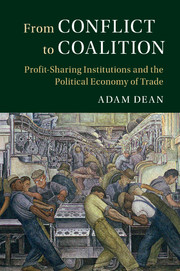Book contents
- Frontmatter
- Dedication
- Contents
- List of Figures
- List of Tables
- Acknowledgments
- 1 Introduction
- 2 A Theory of Profit-Sharing Institutions
- 3 Evidence and Research Design
- 4 The Gilded Wage: Trade Politics in the American Textile and Steel Industries
- 5 Liberalized by Labor
- 6 Trade Politics in Britain and Argentina
- 7 Power Over Profits
- 8 Conclusion
- References
- Index
- Miscellaneous Endmatter
8 - Conclusion
Published online by Cambridge University Press: 05 September 2016
- Frontmatter
- Dedication
- Contents
- List of Figures
- List of Tables
- Acknowledgments
- 1 Introduction
- 2 A Theory of Profit-Sharing Institutions
- 3 Evidence and Research Design
- 4 The Gilded Wage: Trade Politics in the American Textile and Steel Industries
- 5 Liberalized by Labor
- 6 Trade Politics in Britain and Argentina
- 7 Power Over Profits
- 8 Conclusion
- References
- Index
- Miscellaneous Endmatter
Summary
The assumption of many political economists that the interests of these two classes are identical, that the employer is best able to judge what is expedient, and that therefore the employee should trust his interests to him, assured that if he takes excessive profits they will, under the action of economical forces, be restored speedily and surely in increased wages, is both absurd and dangerous. The tendency of these economical forces under present conditions is the perpetuation and deepening of industrial injustice.
Joseph D.Weeks, 1886For at least the past thirty years, scholars of international trade have assumed that the benefits of international trade policy are automatically shared between capital and labor. Based on this assumption, canonical works in the field argue that trade policy reform is often driven by a harmonious coalition of capital and labor in favor of the same international trade policy. In direct contrast, this book demonstrated that this conventional wisdom is based on a flawed understanding of history that systematically ignores major instances of class conflict. Workers often disagree with their employers concerning international trade policies that benefit their own industry of employment. Indeed, they commonly argue that trade policy reforms will increase profits for their employers without leading to increased wages for themselves. Although such worker concerns have shaped trade policy debates for the past 200 years, they cannot be explained by the traditional theories that dominate research in political economy. In short, how are we to understand when workers and their employers will actually share the same international trade policy preference?
This book brings domestic labor markets and class conflict back into the political economy of international trade. It argued that labor's trade policy preferences depend on a previously omitted factor: the presence or absence of “profit-sharing institutions.” Profit-sharing institutions are defined as a set of rules that govern wage negotiations and create a credible link between an increase in profits and an increase in workers’ wages. When profit-sharing institutions are in place, I predict that workers will be more likely to agree with their employers concerning international trade policy. However, when profit-sharing institutions are absent, I predict that workers will be more likely to disagree with their employers concerning trade policy.
Profit-sharing institutions help us understand variation in workers’ trade policy preferences that cannot be explained by the neoclassical models traditionally used in the field.
- Type
- Chapter
- Information
- From Conflict to CoalitionProfit-Sharing Institutions and the Political Economy of Trade, pp. 199 - 207Publisher: Cambridge University PressPrint publication year: 2016



